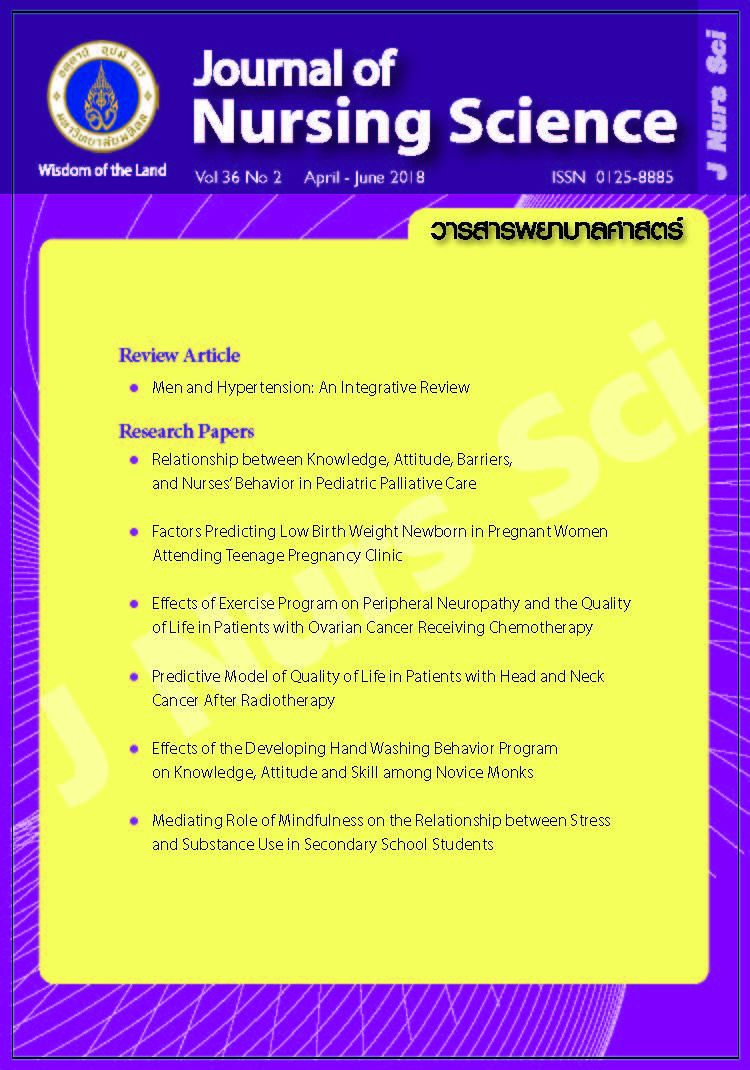Men and Hypertension An Integrative Review
Main Article Content
Abstract
Purpose: To synthesize the evidence as it pertains to hypertension in men.
Design: An integrative literature review was conducted. This review included both qualitative and quantitative studies that focused on hypertension in men. A search for relevant literature published from 2007 to 2017 was undertaken using PubMed, CINAHL, Ovid MEDLINE, and EBSCO databases and by examining relevant bibliographies. Seven studies (n = 7) formed the basis of this review. Findings from the identified research literature were analyzed and described using conventional content analysis.
Main findings: Five main categories emerged from the content analysis: 1) understanding symptoms of hypertension; 2) knowledge regarding consequences of hypertension; 3) adherence to a healthy lifestyle and medical treatment; 4) self-management; and 5) interventions that were designed to improve blood pressure control.
Conclusion and recommendations: Experiencing symptoms and viewing themselves as being at risk seem to be essential for male hypertensive patients to seek health care. Future research should explore and explain clearly how male hypertensive patients develop a sense of risk, what factors can contribute to a sense of risk and how the sense of risk motivates male hypertensive patients to change behavior.
Article Details
Copyright Notice: Nursing Science Journal of Thailand has exclusive rights to publish and distribute the manuscript and all contents therein. Without the journal’s permission, the dissemination of the manuscript in another journal or online, and the reproduction of the manuscript for non-educational purpose are prohibited.

Disclaimer: The opinion expressed and figures provided in this journal, NSJT, are the sole responsibility of the authors. The editorial board bears no responsibility in this regard.
References
2. Saeed AA, Al-Hamdan NA, Bahnassy AA, Abdalla AM, Abbas MA, Abuzaid LZ. Prevalence, awareness, treatment, and control of hypertension among Saudi adult population: a national survey. Int J Hypertens. 2011;2011:174135. doi: 10.4061/2011/174135. PubMed PMID: 21912737; PubMed Central PMCID: PMC3168271.
3. Ibrahim MM, Damasceno A. Hypertension in developing countries. Lancet. 2012;380(9841):611-9.
4. Gao Y, Chen G, Tian H, Lin L, Lu J, Weng J, et al. Prevalence of hypertension in China: a cross-sectional study. PLoS One. 2013 Jun 11;8(6):e65938. doi: 10.1371/journal.pone.0065938. PubMed PMID: 23776574; PubMed Central PMCID: PMC3679057.
5. Helelo TP, Gelaw YA, Adane AA. Prevalence and associated factors of hypertension among adults in Durame Town, Southern Ethiopia. PloS One. 2014 Nov 21;9(11):e112790. doi: 10.1371/journal.pone.0112790. PubMed PMID: 25415321; PubMed Central PMCID: PMC4240541.
6. Amaral O, Chaves C, Duarte J, Coutinho E, Nelas P, Preto O. Treatment adherence in hypertensive patients - a cross-sectional study. Procedia Soc Behav Sci. 2015 Jan 16;171:1288-95. doi: 10.1016/j.sbspro.2015.01.243.
7. Wang W, Lau Y, Loo A, Chow A, Thompson DR. Medication adherence and its associated factors among Chinese community-dwelling older adults with hypertension. Heart Lung. 2014;43(4):278-83.
8. Abdul-Razak S, Daher AM, Ramli AS, Ariffin F, Mazapuspavina MY, Ambigga KS, et al. Prevalence, awareness, treatment, control and socio-demographic determinants of hypertension of hypertension in Malaysian adults. BMC Public Health. 2016;16(1):[351]. doi: 10.1186/s12889-016-3008-y.
9. Muhanmedhussein MS, Nagri ZI, Manji KP. Prevalence, risk factors, awareness, and treatment and control of hypertension in Mafia Island, Tanzania. Int J Hypertens. 2016;2016:1281384. doi: 10.1155/2016/1281384. PubMed PMID: 27525113; PubMed Central PMCID: PMC4971322.
10. Miller AP, Navar AM, Roubin GS, Oparil S. Cardiovascular care for older adults: hypertension and stroke in the older adult. J Geriatr Cardiol. 2016;13(5):373-9.
11. Choi HM, Kim HC, Kang DR. Sex differences in hypertension prevalence and control: analysis of the 2010-2014 Korea National Health and Nutrition Examination Survey. Plos One. 2017 May 25;12(5):e0178334. doi: 10.1371/journal.pone.0178334. PubMed PMID: 28542557; PubMed Central PMCID: PMC5444798.
12. Hussain MA, Mamun AA, Reid C, Huxley RR. Prevalence, awareness, treatment, and control of hypertension in Indonesian adults aged ≥40 years: findings from the Indonesia Family Life Survey (IFLS). PloS One. 2016;11(8):e0160922. doi: 10.1371/journal.pone.0160922. PubMed PMID: 27556532; PubMed Central PMCID: PMC4996427.
13. Mills KT, Bundy JD, Kelly TN, Reed JE, Kearney PM, Reynolds K, et al. Global disparities of hypertension prevalence and control: a systematic analysis of population-based studies from 90 countries. Circulation. 2016;134(6):441-50.
14. Whittemore R, Knafl K. The integrative review: updated methodology. J Adv Nurs. 2005;52(5):546–53.
15. Critical Appraisal Skills Programme. CASP Checklists [Internet]. Oxford, UK: Critical Appraisal Skills Programme; 1997 [cited 2017 Nov 30]. Available from: https://casp-uk.net/casp-tools-checklists/
16. Hsieh HF, Shannon SE. Three approaches to qualitative content analysis. Qual Health Res. 2005;15(9):1277–88.
17. Long E, Ponder M, Bernard S. Knowledge, attitudes, and beliefs related to hypertension and hyperlipidemia self-management among African-American men living in the southeastern United States. Patient Educ Couns. 2017;100(5):1000-6.
18. Bennett J. Beliefs and attitudes about medication adherence in African American men with high blood pressure. MedSurg Matters Newsletter. 2013;22(3):4.
19. Fort MP, Castro M, Pena L, Lopez Hernandez SH, Arreola Camacho G, Ramirez-Zea M, et al. Opportunities for involving men and families in chronic disease management: a qualitative study from Chiapas, Mexico. BMC Public Health. 2015 Oct 5;15:1019. doi: 10.1186/s12889-015-2361-6. PubMed PMID: 26438195; PubMed Central PMCID: PMC4595112.
20. Elder K, Ramamonjiarivelo Z, Wiltshire J, Piper C, Horn WS, Gilbert KL, et al. Trust, medication adherence, and hypertension control in Southern African American men. Am J Public Health. 2012;102(12):2242-5.
21. Welsh FE, Duff EM, Campbell-Taffe K, Lindo JL. Lifestyles of Jamaican men with hypertension. J Transcult Nurs. 2015;26(5):507-13.
22. Dennison CR, Post WS, Kim MT, Bone LR, Cohen D, Blumenthal RS. Underserved urban African American men: hypertension trial outcomes and mortality during 5 years. Am J Hypertens. 2007;20(2):164-71.
23. Elbur A. Level of adherence to lifestyle changes and medications among male hypertensive patients in two hospitals in Taif; Kingdom of Saudi Arabia. Int J Pharm Pharm Sci. 2015;7(4):168-72.
24. Kamran A, Sadeghieh Ahari S, Biria M, Malepour A, Heydari H. Determinants of patient’s adherence to hypertension medications: application of health belief model among rural patients. Ann Med Health Sci Res. 2014;4(6):922-7.
25. Robertson S, Sheikh K, Moore A. Embodied masculinities in the context of cardiac rehabilitation. Social Health Illn. 2010;32(5):695–710.


